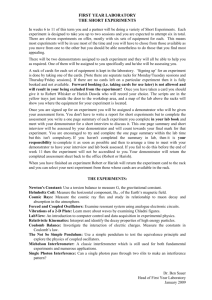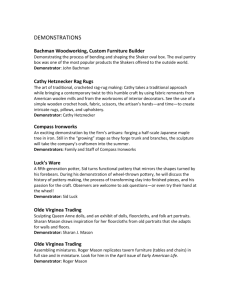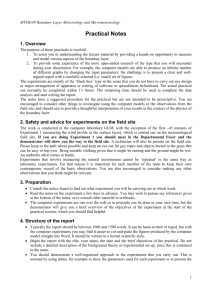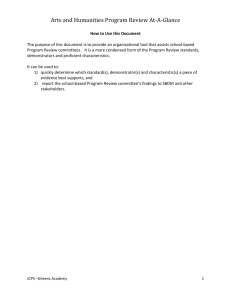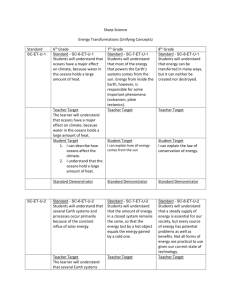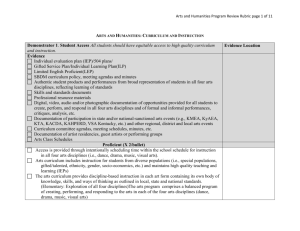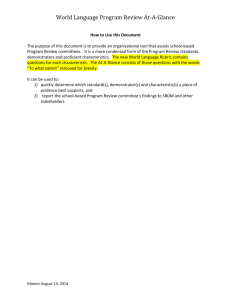Simplified Summary of Rubrics
advertisement
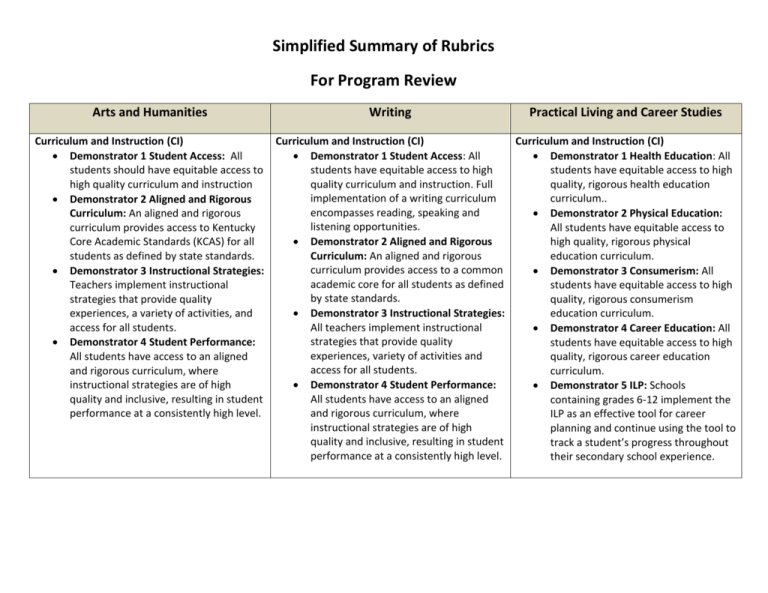
Simplified Summary of Rubrics For Program Review Arts and Humanities Writing Practical Living and Career Studies Curriculum and Instruction (CI) Curriculum and Instruction (CI) Curriculum and Instruction (CI) Demonstrator 1 Student Access: All Demonstrator 1 Student Access: All Demonstrator 1 Health Education: All students should have equitable access to students have equitable access to high students have equitable access to high high quality curriculum and instruction quality curriculum and instruction. Full quality, rigorous health education implementation of a writing curriculum curriculum.. Demonstrator 2 Aligned and Rigorous encompasses reading, speaking and Curriculum: An aligned and rigorous Demonstrator 2 Physical Education: listening opportunities. curriculum provides access to Kentucky All students have equitable access to Demonstrator 2 Aligned and Rigorous Core Academic Standards (KCAS) for all high quality, rigorous physical students as defined by state standards. Curriculum: An aligned and rigorous education curriculum. curriculum provides access to a common Demonstrator 3 Instructional Strategies: Demonstrator 3 Consumerism: All academic core for all students as defined Teachers implement instructional students have equitable access to high by state standards. strategies that provide quality quality, rigorous consumerism experiences, a variety of activities, and Demonstrator 3 Instructional Strategies: education curriculum. access for all students. All teachers implement instructional Demonstrator 4 Career Education: All strategies that provide quality Demonstrator 4 Student Performance: students have equitable access to high experiences, variety of activities and All students have access to an aligned quality, rigorous career education access for all students. and rigorous curriculum, where curriculum. instructional strategies are of high Demonstrator 4 Student Performance: Demonstrator 5 ILP: Schools quality and inclusive, resulting in student All students have access to an aligned containing grades 6-12 implement the performance at a consistently high level. and rigorous curriculum, where ILP as an effective tool for career instructional strategies are of high planning and continue using the tool to quality and inclusive, resulting in student track a student’s progress throughout performance at a consistently high level. their secondary school experience. Formative and Summative Assessment (FSA) Demonstrator 1 Assessment: Teachers should use multiple assessment processes to inform, guide, develop and revise instructional strategies and curriculum to enhance student learning and achievement. Demonstrator 2 Expectations for Student Learning: Teachers communicate consistently high expectations and use common standards for student learning in Arts and Humanities. Demonstrator 3 Assessment for Teaching: Multiple assessments are used to inform, guide, develop and revise instructional strategies and curriculum to enhance student learning and achievement. Professional Development (PD) Demonstrator 1 Opportunity: Professional development opportunities are planned with teacher learning needs in mind and in response to data available about teacher practice and student learning. Demonstrator 2 Participation: Teachers participate in Arts and Humanities-specific professional development designed to meet their needs. Arts and Humanities teachers participate in professional development focused on 21st Century Skills. Administrative/Leadership Support and Monitoring (ALS) Demonstrator 1 Policies and Monitoring: School leadership establishes and monitors implementation of policies, provides adequate resources, facilities, space and instructional time to support highly effective arts and humanities instructional programs. Demonstrator 2 Principal Leadership: Principals are the primary leaders of all arts and humanities program efforts and support teacher leadership through shared leadership strategies and actions. Formative and Summative Assessment (FSA) Demonstrator 1 Assessment: Teachers use multiple formative and summative assessment processes to inform, guide, develop and revise instructional strategies and curriculum to enhance student learning and achievement. Demonstrator 2 Expectations for Student Learning: Teachers communicate consistently high expectations and use common standards for student learning in writing. Demonstrator 3 Assessment for Teaching: Teachers communicate consistently high expectations and use common standards for student learning in writing. Professional Development (PD) Demonstrator 1 Opportunity: Professional development opportunities are planned with teacher learning needs in mind and in response to data available about teacher practice and student learning. Demonstrator 2 Participation: Teachers participate in writing specific professional development designed to meet their needs. All teachers participate in professional development focused on 21st century skills. Administrative Support and Monitoring (ALS) Demonstrator 1 Policies and Monitoring: School leadership provides adequate resources, facilities, space and instructional time to support high quality writing instructional programs. Demonstrator 2 Principal Leadership: Principals are the primary leaders of all program efforts and support teacher leadership through shared and distributed leadership strategies and actions. Formative and Summative Assessment (FSA) Demonstrator 1 Assessment: Teachers should use multiple assessment processes to inform, guide, develop and revise instructional strategies and curriculum to enhance to student learning and achievement. Demonstrator 2 Expectations for Student Learning: Teachers communicate consistently high standards for student learning in the content area. Professional Development (PD) Demonstrator 1 Opportunity: Professional development opportunities are planned with teacher learning needs in mind, and in response to data available about teacher practice and student learning. Demonstrator 2 Participation: Teachers participate in PLCS professional development designed to meet their needs. PLCS teachers participate in professional development focused on 21st Century Skills. Administrative Support and Monitoring (ALS) Demonstrator 1 Policies and Monitoring: School leadership establishes and monitors implementation of policies, provides adequate resources, facilities, space and instructional time to support highly effective PLCS instructional programs Demonstrator 2 Principal Leadership: Principals are the primary leaders of all PLCS program efforts and support teacher leadership through shared leadership strategies and actions.
